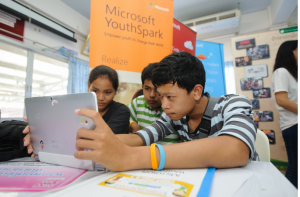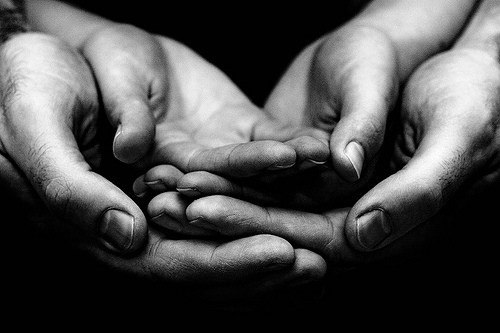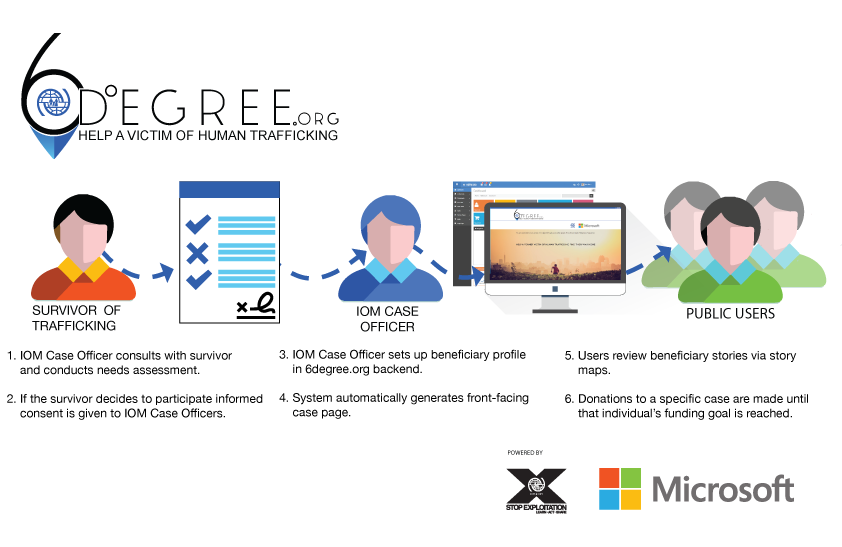Microsoft on board as key technology partner for USAID Asia Counter Trafficking in Persons program
By: John Cann, Managing Director, International Organizations, Public Sector Asia, Microsoft
 There’s big money in human trafficking – it is one of the largest, best-organized and most profitable types of crime. The International Labour Organisation (ILO) estimates that the illicit trade generates annual profits of some US$150 billion a year for traffickers.
There’s big money in human trafficking – it is one of the largest, best-organized and most profitable types of crime. The International Labour Organisation (ILO) estimates that the illicit trade generates annual profits of some US$150 billion a year for traffickers.
The number of men, women and children who end up victims of trafficking and exploitation the world over amount to nearly 21 million individuals. Closer to home, Asia-Pacific’s share accounts for a whopping 11.7 million, or over half the global number.
Human trafficking remains the fastest growing criminal enterprise today. As it turns out, human traffickers are also well-versed in technology and quick to adopt the latest IT trends. With the proliferation of smartphone usage and internet accessibility, they are taking advantage of online platforms for recruitment, especially amongst less sophisticated and therefore more vulnerable populations that are just only beginning to find their places online.
However, traffickers’ use of common technology platforms and electronic devices offer a wealth of data, a digital breadcrumb trail if you will, when combined with analytics, can be immensely useful in identifying, tracking down and ultimately bringing traffickers to justice.
This highlights a major challenge that is facing the public sector in the ability to adequately process and manage this deluge of data available online. On the plus side, it is now the norm that the private sector uses data analytics to drive critical business decisions. It therefore stands to reason that those innovations, tools, thinking and learnings can be repurposed towards that of solving social problems.
Key technology partner for the new USAID Asia CTIP program
With that in mind, I’m glad to share our involvement with a new regional program launched by the US Agency for International Development (USAID). The USAID Asia Counter Trafficking in Persons (USAID Asia CTIP) program seeks to collaborate with relevant stakeholders in the region to combat human trafficking. Microsoft is partnering with Winrock International, a leading non-profit organization that is dedicated to improving lives and empowering the disadvantaged, to provide USAID Asia CTIP with the technical expertise needed to address this issue. As the key technology partner for USAID Asia CTIP, Microsoft will share best practices in applying technology to anti-human trafficking solutions with various non-profits and non-governmental organizations (NGOs) involved in the program.
During this three-year project, Winrock will also team up with Asian governments, NGOs, civil society organizations and companies in the private sector to reduce human trafficking. Winrock will concentrate on improving cooperation among government social services agencies, law enforcement bureaus, healthcare providers and anti-trafficking advocacy organizations to stem the demand and supply for trafficked persons across the region.
The program will first focus its efforts in the Lower Mekong countries of Burma, Cambodia, Laos, Thailand, Vietnam and Bangladesh. It will later expand to include other ASEAN member states, as well as South Asia and destination countries in East Asia and the Gulf States.
This initiative is not just a continuation but a strengthening of our partnership with USAID in Asia. We’ve previously worked together to support the International Organization for Migration (IOM) on 6degree.org. This is an online crowdfunding portal in which individuals can donate money that will be used by trafficking victims to rebuild their lives. It’s backed by the high security and compliance standards of the Microsoft Azure cloud computing platform. Along with the U.S. Embassy Singapore, USAID and Microsoft were also partners supporting the IOM’s X campaign (IOM X), a pilot outreach program aimed at raising awareness about human trafficking in Singapore.
Technology vs Trafficking
Microsoft is committed to supporting anti-trafficking efforts and in making technologies and tools available in the battle against human trafficking, regardless of whether it is an initiative that spans across international borders, or a collaboration with government law enforcement units. These include:
- Microsoft YouthSpark – Computer Science and ICT Education to Empower At-Risk Trafficking Youths program in Thailand. This is a joint effort with the United Nations Action for Cooperation Against Trafficking in Persons (UN-ACT), World Vision, International Organization for Migration (IOM), and the National Council for Child and Youth Development (NCYD). The program provides children with training sessions on computer literacy, access to valuable tools and knowledge as well as opportunities to create sharable content that raises public awareness of the human trafficking problem. This builds in-depth understanding, and enables participants to better protect themselves and their communities.
- PhotoDNA. A product that creates a unique fingerprint-like signature for images that can be used to better identify child pornography online, which has been donated to Interpol for its International Child Sexual Exploitation (ICSE) database.
- Over in Canada, Microsoft developed in collaboration with Canadian law enforcement, the Child Exploitation Tracking System (CETS), which is a software-based solution that both manages and links child protection cases across jurisdictional boundaries worldwide.
- Computer Online Forensic Evidence Extractor (COFEE). This kit helps computer forensic investigators extract digital evidence from any computer using a Windows operating system.
- Guardian App. This app leverages mobile technology to provide real time tracking, two-way communication and enhanced situational awareness for those at risk, their families and law enforcement.
- And of course, the Microsoft Digital Crimes Unit (DCU). Our organization of attorneys, investigators, forensic analysts, and business professionals in 30 countries around the world assist law enforcement in combatting all types of cybercrime to help create a safer digital world.

The technologies of today’s “mobile-first, cloud-first” world can be put to good use to help disrupt the global problem of human trafficking. Big data and analytics, transformed via the cloud, can offer law enforcement agencies insights on an unprecedented scale, with unparalleled timeliness. This not only improves efficiency, but also to help educate those at risk and their families, as well as disrupting criminal operations by increasing the risk and reducing the rewards of their activities. It is also a powerful tool to get the word out there – raising greater awareness, creating interest and encouraging social change.
The fight against human exploitation is a team play, not an individual sport. Technology plays a major role in bringing together public, private, civic and international organizations to create networks between the people who know where the needs are, and those that have the solutions to address them.
Despite our best efforts, there is still an incredible amount of work to be done. We need to start approaching the issue of trafficking from a technological angle whenever we are embarking on prevention, prosecution and protection – the three ‘P’s in the fight against human trafficking. Only then can we begin to understand how technology is being used by traffickers and how we can then use it to defeat them.






